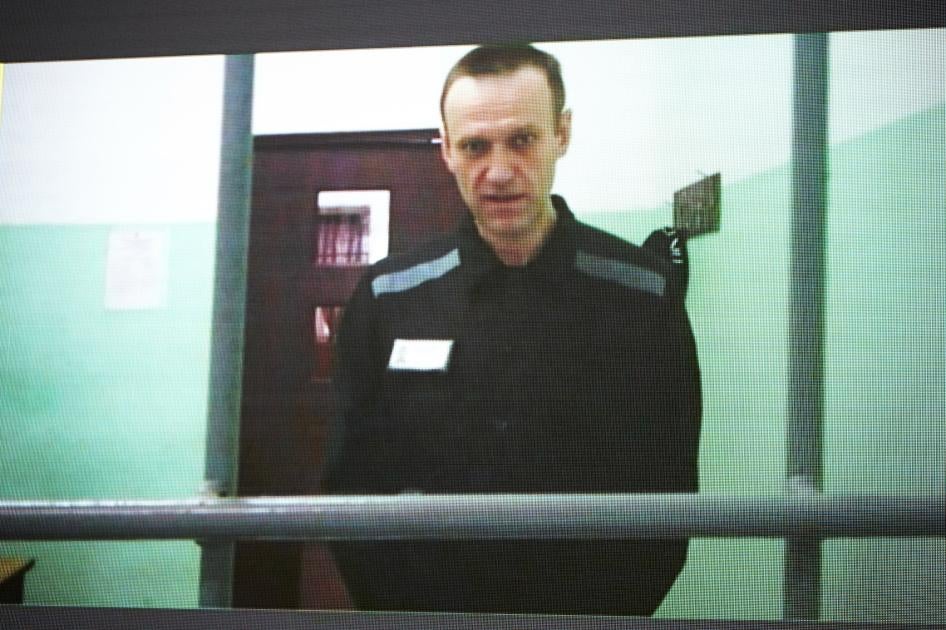Update: On August 4, the Moscow City Court sentenced Daniel Kholodny, former technical director of Navalny's YouTube channel, to 8 years in prison.
(Berlin, August 4, 2023) – A Moscow court’s new sentence for the leading Russian opposition activist Alexey Navalny is in an obvious attempt to ensure that he remains incarcerated and isolated for any foreseeable future, Human Rights Watch said today. Navalny was sentenced to 19 years in a maximum-security prison designed for particularly dangerous recidivists and those serving life sentences.
“The totally unfounded new conviction against Alexey Navalny is a testament to the Kremlin’s resolve to decapitate Russian opposition for many years to come,” said Hugh Williamson, Europe and Central Asia director at Human Rights Watch. “The Russian authorities have abandoned any pretense of justice in dealing with dissenters, and with Navalny they have thrown a litany of charges against him, each more brazenly absurd than the next.”
Navalny was convicted in a closed trial on seven charges pertaining to six criminal articles, including for extremism, creating a nongovernmental organization (NGO) that the Russian authorities consider violates the rights of its citizens or incites illegal activities, involving children in “illegal activities,” and the rehabilitation of Nazism.
Navalny explained in his social media post that the rehabilitation of Nazism charges pertain to a statement by one of his aides, Leonid Volkov, on Popular Politics, a YouTube channel maintained by his supporters, while Navalny was already serving his earlier nine-year prison sentence. Navalny said that Volkov’s comment was that the Nazi army officer Claus von Stauffenberg did the right thing by attempting to assassinate Hitler.
The court sentenced Navalny’s codefendant, Daniel Kholodny, a former technical director of Navalny’s YouTube channel also on unfounded extremism-related charges for involvement with Navalny-affiliated projects. At this writing the sentence was not known.
In 2021, the Moscow City Court banned three groups affiliated with Navalny as extremist, including anti-corruption and human rights organizations and Navalny regional political office, despite the lack of any evidence of their involvement in or incitement of violence.
Russian authorities later opened several criminal cases against Navalny and his aides and supporters on extremism-related charges. Among them was Lilia Chanysheva, the former head of Navalny’s regional political office in Ufa, Bashkortostan.
In June 2023, a court sentenced her to 7.5 years in prison on baseless extremism related charges and for creating an organization “violating the rights of citizens” or inciting illegal activities. The charges were a groundless and blatant persecution for Chanysheva’s legitimate, peaceful political activism, Human Rights Watch said. Chanysheva was also tried behind closed doors.
In 2022, courts fined dozens on administrative charges of displaying “extremist” symbols for social media posts that showed symbols of Navalny’s “Smart Voting” project, or just mentioned it, or displayed the logo of the Foundation Against Corruption, an organization Navalny founded, or included symbols related to his presidential electoral campaign. Those prosecuted included civic activists and independent municipal council members and candidates.
Russia’s overly broad and vague definition of extremism allows authorities to abuse it widely as a tool to persecute peaceful activists, Human Rights Watch said. In 2012 the Council of Europe’s Venice Commission criticized the Russian counterextremism law, and in particular its basic notions, such as definition of extremism, for giving “too wide discretion in its interpretation and application, thus leading to arbitrariness.” Since then, the Russian authorities have further expanded its counterextremism legislation, making it more abusive.
Navalny and Chanysheva were also convicted of involvement with or creating a “harmful NGO,” a convenient tool for smearing and persecuting people for their legitimate, critical protest aimed at the Kremlin.
In 2022, Russian authorities opened several criminal cases on these charges against leaders and activists of the opposition youth movement Vesna (Spring in Russian) for organizing peaceful protests against Russia’s full-scale invasion of Ukraine in February 2022. A court also banned Vesna as extremist in December 2022 for its legitimate and peaceful civic activism.
“The verdicts against Navalny and his affiliates are a travesty of justice, and the ongoing persecution of other peaceful activists is a disgraceful show of cowardice,” Williamson said. “They should be immediately and unconditionally released.”








